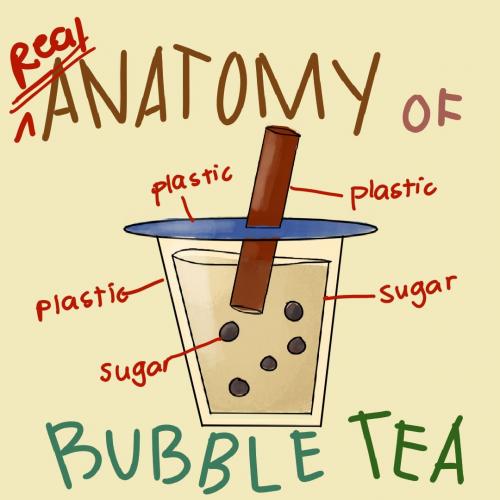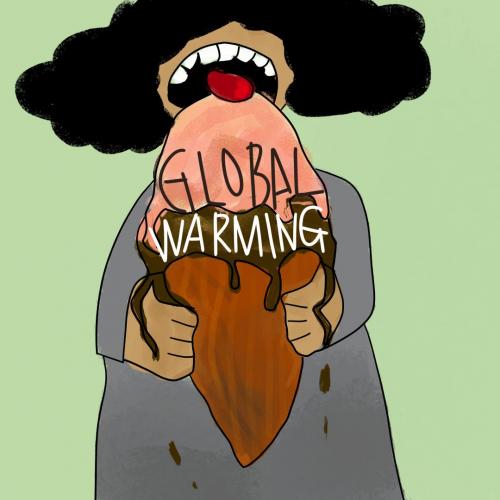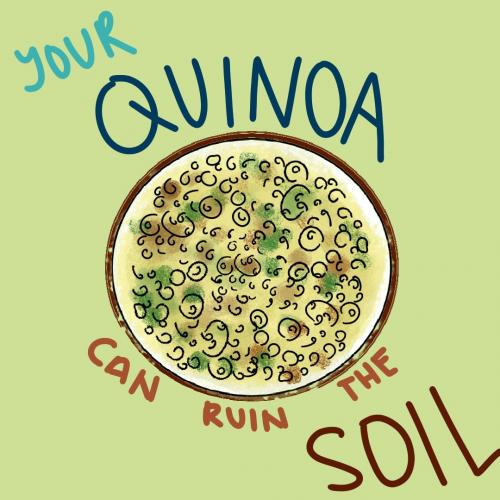Bubble tea. Ice-cream. Yoghurt. Potato chips. What do these have in common? Not many of us pause to consider how our beloved foods are sourced and made, let alone their resulting impact on the environment. Determined to make more conscientious diet choices, ARTHUR ADIMOELIA investigates his grocery list and uncovers some unusual culprits. These 10 items might surprise you.
#1 Bubble Tea

The bubble tea craze has taken the world by storm, and Singapore is no exception, judging from the ubiquitous bubble tea franchises dotting our island. However, these bubbly delights are hurting our environment. Since plastic cups and straws—used to contain and consume the drinks—are non-biodegradable, most of these end up in oceans and cause severe harm to animals that mistake the plastic for food. Used bubble tea cups also cannot be placed into “Plastics”-designated recycling bins as they contain too much liquid and leftover “pearls”, usually made of tapioca. To date, there have been efforts to address bubble-tea-related waste; for instance, Taiwan, "home of bubble teas", is actively promoting the use of reusable straws, and aims to ban disposable plastics by 2030. Meanwhile, more mindful consumption of bubble tea is in order.
#2 Ice-cream

A 2018 study by the University of Manchester assessed the environmental impact of ice-cream and found that premium versions, especially, have a higher global warming potential—chocolate stands at 92 per cent and vanilla at 68. The production of raw milk used in the making of this beloved dessert also contributes significantly to negative environmental impact. As you read this, extensive deforestations are taking place to clear the land for cocoa plantations, and that makes cocoa powder responsible for increasing ice-cream's global warming potential by about 70 per cent. Keep these facts in mind before you order your next double, or triple scoop.
#3 Greek Yoghurt

We seldom hear anyone mention Greek yoghurt without extolling its supposed health benefits. But did you know this incredibly popular food creates a lot of waste? For every kilogram of Greek yoghurt produced, about two to three kilograms of acid whey are left as a by-product. Due to its nutrient-rich content, acid whey cannot be simply flushed down the drain, as the mixture might result in algal blooms that will reduce the levels of dissolved oxygen in the waters. If you're looking for a healthy treat that's also healthy on the environment, Greek yoghurt isn't your best bet.
#4 Potato Chips

Potato chips rank high in the "guilty pleasure" snack category, but they usually come in multi-layered, non-biodegradable plastic packaging. Despite efforts by companies such as Frito-Lay to introduce compostable packaging, severe backlash from customers (apparently due to the loud noise the packaging produces) forced the company to revert to its original, non-green packaging. Until recyclable potato chip packets become the mainstream practice, it may be time to rethink your chip habit.
#5 Nuts

Nuts may seem like a natural and healthy snack compared to crisps and ice-cream, but they're not so great for the planet. First, the production of nut-based products such as almond milk and butters involves the heavy use of water, creating huge ecological implications. Then there's the issue of bees. In California, the almond industry’s almost complete dependence on honeybees to pollinate their almond trees have injured about 80,000 colonies due to the prevalent use of pesticides in their farms. Nothing natural or healthy about these facts, so think twice before reaching for that trail mix.
#6 Quinoa

Quinoa is another product that enjoyed a huge popularity boost as a result of several healthy diet fads. But this superfood's impact on the environment is often masked by its purported benefits. According to a study by the University of Copenhagen, intense cultivation methods used to facilitate quinoa production in Bolivia are what's causing soils to lose fertility, effectively turning once arable lands into deserts. That is a high price to pay, even for a superfood.
#7 Bagged Salads

Born out of the desire for healthy and convenient foods, bagged salads became popular grocery items in the late 2010s. In the United Kingdom, nonetheless, about 178 million bagged salads are thrown out every year as waste, along with their single-use plastic packaging. In addition, recent cases of E. coli outbreaks and product recalls have called into question just how healthy bagged salads really are.
#8 Rice

Despite being a staple food for many countries, rice production is notoriously harmful to the environment. Rice crops that grow in flooded field produce twice as much greenhouse gases compared to grain alternatives such as wheat. Moreover, the process of alternately wetting and drying rice fields—while reducing methane levels—is producing up to 45 times more nitrous oxide than constantly flooded fields. This presents a serious challenge to the ozone layer as nitrous oxide is 300 times more damaging than carbon dioxide and stays around for over 100 years longer. Food for thought, surely, when we consider how much rice we eat at every meal.
#9 Beef

Beef is a popular choice for steaks and hotpots, but these succulent meats are about 34 times more climate pollution intensive than beans and lentils. Compared to pork or chicken, beef consumption also has a much higher negative impact on the environment. Cattle ranchers and their slash-and-burn practices have been blamed for the 2019 Amazon wildfires, while the production, processing and distribution of beef continue to create large carbon footprints. Before that steak hits your plate, think of the huge quantities of pesticides, fertiliser, fuel, feed and water involved to raise and feed the livestock, and the release of greenhouse gases, manure and toxic chemicals into our air and water.
#10 Farmed Fish

With farmed fish production expected to more than double by 2050 in order to meet the growing demand for seafood, aquaculture has become more expansive. This has significant implications for our oceans and ecology. For one, it takes large numbers of wild fish to feed certain farmed fish. Second, the resultant waste from a huge crowd of fish packed together causes ocean pollution. Further, fish farms, if not managed properly, can become breeding grounds for diseases. Aquaculture can also negatively affect the biodiversity of its immediate environment; for instance, shrimp farming in Indonesia is at least partly responsible for the region's declining mangrove forests. Your appetite for seafood shouldn't come at the expense of the planet: wherever possible, obtain your fish from responsible sources.
Banner image via rawpixel. All other creative visuals by Athena Macatangay.
|
|
Arthur Adimoelja is a Year 4 undergraduate from the Singapore Management University's School of Social Sciences. When not writing (rarely), he can be found at the nearest study space watching a new series on Netflix. He can be reached at arthura.2016@socsc.smu.edu.sg |










Comments
- Reply
Permalink